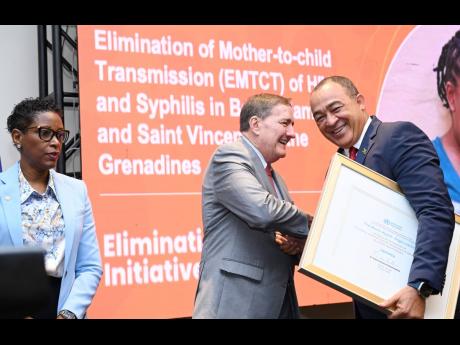DISEASE TRANSFER ELIMINATED
Jamaica ends HIV and syphilis transmission from mother to child
Jamaica’s goal to end the HIV/AIDS epidemic as a public health threat by 2030 has been bolstered by its recent certification from the World Health Organization (WHO) for the elimination of mother-to-child transmission of HIV and syphilis (EMTCT).
It is an achievement that Minister of Health Dr Christopher Tufton has declared a victory in the fight against HIV, stating that it is the outcome of concerted national action.
“Jamaica’s success on the elimination of mother-to-child transmission of HIV and syphilis signals an enduring commitment to the sustainable development goals of ensuring healthy lives and promoting well-being for all people of all ages,” he said.
More than two decades ago, Jamaica embarked on this mission through its Prevention of Mother-to-Child Transmission Programme. It now joins Belize and St Vincent and the Grenadines as the latest territories to attain this milestone.
Speaking at a ceremony held at The Jamaica Pegasus hotel to recognise the achievement yesterday, Tufton noted that the validation from WHO is an indication of the “extraordinary progress” being made in Jamaica’s maternal healthcare.
“Jamaica’s public health system is moving increasingly towards higher service delivery. Among the important provisions have been access to antenatal care, increasing HIV testing and counselling among pregnant women through the expansion of healthcare provider initiatives and continued care management of syphilis exposed infants,” he said.
MANAGEMENT OF SYPHILIS
He added that the management of syphilis in pregnant women has continued to improve with access to diagnosis and appropriate treatment.
Olga Isaza, UNICEF representative to Jamaica, lauded the elimination of mother-to-child transmission of HIV and syphilis in these three Caribbean territories as a crucial step in guaranteeing children’s right to health.
However, she said many children in the Latin America Caribbean (LAC) region are being left behind in the progress to end AIDS, noting that antiretroviral treatment for children and young adolescents falls below the global average of 57 per cent.
“In 2022, only 39 per cent of children between 0 and 14 years living with HIV in the LAC region received antiretroviral therapy. Compare this to about 70 per cent for those who are 15 years and above,” she said. “We need to work harder to increase the coverage for diagnosis and treatment for all and especially for children.”
She challenged these countries to encourage and rally other governments to prioritise adequate and sustained investment in healthcare to improve quality primary healthcare services and make them sustainable.
Christine Stegling, deputy executive director; policy, advocacy and knowledge director UNAIDS and assistant secretary general of the United Nations, similarly lauded the governments of Jamaica, Belize and St Vincent and the Grenadines for exercising “powerful political choice” in attaining this achievement and called on other countries to emulate.
A MODEL FOR THE WORLD
“What has happened in this region is a model for the world, and I want to emphasise this because it only happens with political will and determination that we get to the point that we are today. It represents years of efforts that healthcare providers and communities of people living with HIV working together to ensure health systems have strong maternal, neonatal and child health programmes,” she said, noting that Cuba was the first country in the world to achieve this milestone in 2015.
In 2010, countries of the Americas committed to the elimination of mother-to-child transmission of HIV and syphilis and endorsed the regional strategy. This was updated in 2016 under the Pan American Health Organization (PAHO) Plan of Action for the Prevention and Control of HIV and Sexually Transmitted Infections.
To meet elimination targets, countries focused on strengthening prevention and treatment services within primary healthcare and in maternal and child health, updating guidelines, ensuring the effective screening of pregnant women, monitoring cases and following-up with HIV and syphilis-exposed infants.
Globally, a total of 17 countries have eliminated mother-to-child transmission of HIV and syphilis, with 11 of those countries in the LAC region.
Meanwhile, Director of PAHO, Jarbas Barbosa, congratulated the countries, noting that it is a “testament of years and dedication and hard work”.
He also hailed front line healthcare workers as the catalyst for this change.
“I encourage countries to leverage this EMTCT achievement and the experience to tackle other diseases including the more than 30 communicable diseases and related conditions for which elimination is possible,” he said.
Tufton in the meantime acknowledged that there is “no room for complacency”, sharing that the work continues.
“As the public health system heightened its progress in client centred care, HIV prevention, care and treatment must and will remain a priority,” he said. “When we elevate the health status of the most vulnerable, we advance the health of the entire nation and indeed I dare say the region and the Americas.”

